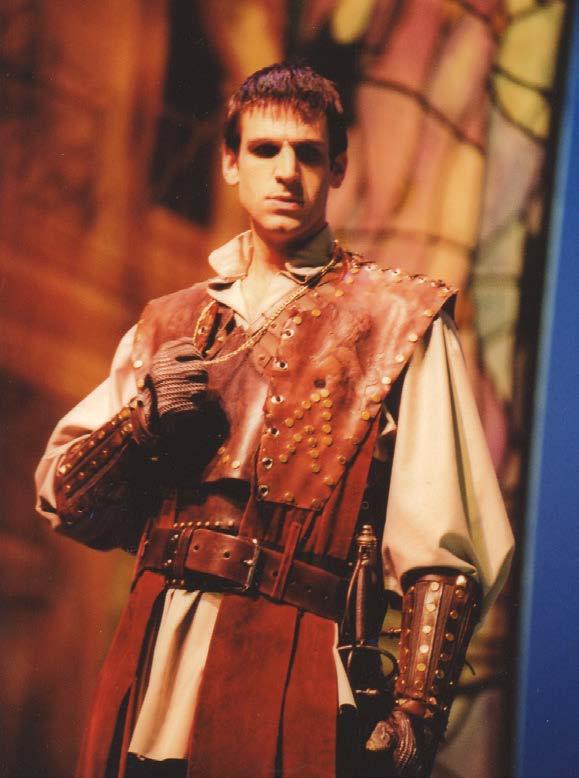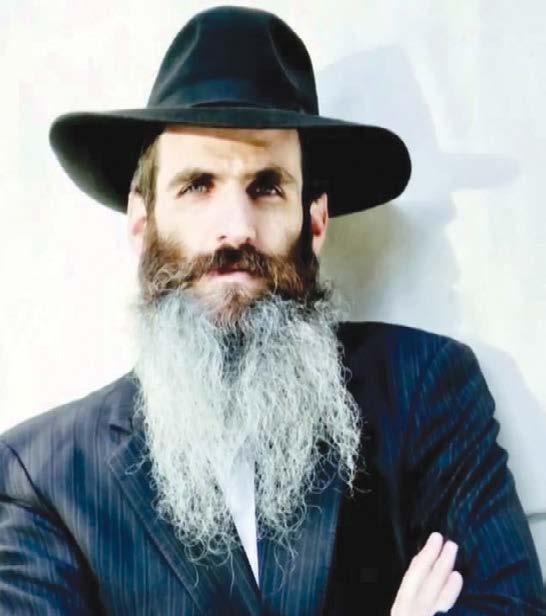
15 minute read
The Journey of the Baritone Bartender
Babinet spent his early years in Greenwich, Connecticut, after his parents relocated the family from New York for the superior schooling shortly after he was born. Babinet describes his parents as ex-hippies, his Jewish mom originating from Queens and his father from France. The youngest of three brothers, Babinet says his family didn’t practice much religion, “Chanukah candles and Seder… sometimes.” His Judaism was never much more than a cultural identity in those days, he explains: “I’m Jewish and French, like any nationality in the United States where everyone comes from different backgrounds.”
When he was 15, the family moved to Boulder, Colorado, where Babinet relished the great outdoors and activities such as skiing and rock-climbing. It was after a minor rock-climbing accident that he was forced to sit still and had time to contemplate his future.
Advertisement
“I was sitting on my tail and thinking about my life. I decided I wanted to get into theater,” he said. “I auditioned for a play and that soon led to a musical and taking voice lessons. I was planning to study music in college, but I wanted to do it as an elective or a minor.”
Babinet’s direction changed pretty quickly upon his arrival at the University of Colorado.
“I walked into the music school and they said the only way to take any classes here is to audition – and that there was an audition going on across the hall. I just walked into it – I just so happened to have music with me since I had been taking voice lessons for a year already.”
Babinet was told he was extremely talented and needed to start practicing immediately. He heeded the advice and joined the very specialized program at the music school; he ended up giving up the liberal arts path and took his music very seriously.
The instructor gave him the advice that set him on his career path and on the path to success: “You have the talent,” his teacher told him. “But the talent is just a starting point.”
Babinet holds it as a universal lesson.
“You need to have a little talent, like 15-20 percent, and
the rest is just hard work,” he maintains.
His success as an undergrad earned him acceptance into the top master’s program for opera at the University of Cincinnati. He sang in several operas in Cincinnati and gained lots of experience and advanced training, as the school typically hosts six to seven full opera productions a year plus some concerts – more than most opera companies.
Babinet participated in a singing program in Italy and traveled to New York to the Brooklyn Academy of Music, where he was recognized on the city streets for his performance there. After his time in Cincinnati, Babinet went on to join prestigious opera programs in Portland and Chicago. He won awards for his talents and was fully immersed in his craft at this point in his life with no “plan B.” He was part of a very elite and highly competitive group; most of his former peers are professional opera singers today.
Babinet landed in Los Angeles and had incredible opportunities with the LA Opera.
He performed in La Boheme on the mainstage and worked with some of the biggest opera stars, including the company’s director Placido Domingo and star Russian soprano Anna Netrebko. He embraced the rigorous schedule and the glamorous world, and his growing success enabled him to purchase a house in Los Angeles.
It was around this time Babinet picked up an unrelated new hobby, which would serve him later on in his journey. He learned how to brew beer from a friend who had been brewing his own.
In 2004, Babinet applied to an opera festival in Tel Aviv to sing in a production of Falstaff. It was his first visit, and even without a strong focus on the Jewish sites of the Holy Land, Babinet felt the impact of the ancient history of Israel more profoundly than in any of his visits to Europe. In his travels, Babinet met an eccentric “kabbalist” dressed in a robe surrounded by groupies. Though Babinet didn’t believe he was too authentic, the man shared a message that stuck with Babinet
and prompted his next move.
“He told me, ‘Your body is your main thing and your soul is really weak and frail. You need to give your soul some nourishment and make your soul more healthy.’
“Meeting so many Jewish people and being in a Jewish country was really eye-opening. When I came back, I was like, I need more of this, I need to get into this somehow.”
A visit to the Kabbalah Centre in LA upon his return fell short of expectations. Fortunately, Babinet found Chabad.
“I think chassidus takes kabbalah and applies it to serving G-d in a way we can relate to and teaches us about our neshama,” he says.
“I tried a bunch of different synagogues and I ended up at Chabad because that’s really what felt the most authentic to me. I didn’t even know what Chabad was – I just called them and they were very friendly, and I became part of the family.”
Babinet bonded quickly with Rabbi Simcha Backman of the Chabad in Glendale. The rabbi gave him a CD of Cantor Yossele Rosenblatt which inspired Babinet to devote time practicing to be a chazzan.
“I thought that was amazing,” he shares. “I was really blown away – this is opera singing but it’s like singing to G-d. Opera is very beautiful, but you’re not singing to G-d. A lot of the stories are pretty silly, and this is very significant.
“You have the beauty of the human voice but you also have this beautiful expression, the unique expression of talking to G-d with your beautiful voice.”
By the following March, Babinet had secured an agent in New York who was a serious business partner with real contacts and connections. He informed Rabbi Backman that he was headed to New York for some opera competitions and auditions and would be there during Purim. The rabbi connected him with his friend who was the gabbai at Bais Shmuel, one of the biggest and liveliest shuls in Crown Heights.
When Babinet arrived in Brooklyn for Purim, he accidentally ended up at Chabad Headquarters at 770 and was taken aback by the size and atmosphere. When he finally found the right event and introduced himself as “David,” he was mistaken for the bartender. “They put me to work at the bar – I didn’t look like I was from Crown Heights!” he quips.
Fortunately, the actual bartender eventually came to the event.
“Maybe it was a little bit of a prophesy,” muses Babinet.
Purim 2005 was on a Thursday night, and Babinet ended up staying through Shabbos. His host connected him with Rabbi Backman’s

father-in-law Rabbi Avrohom Lipskier, who was visiting 770, in hopes Babinet would consider learning in his yeshiva. Babinet met with him and learned a meaningful passage on hagaddah. He ended up visiting the yeshiva the following Shabbos, as the rabbi asked him to “help with the minyan.” The stage was being set for Babinet’s next act.
Babinet’s enthusiastic host also convinced him it was time to have a bris; within the week arrangements were made.
“I was 29 years old,” Babinet says. “It was not easy, but you know, it’s gotta be done.”
The following summer, Babinet returned to the same opera program in Israel. By this time, though, he had decided to start wearing a yarmulke every day and keeping Shabbos. It was definitely a different kind of trip and the experiences left a lasting impression.
“I went to Tzfat,” he recalls. “I went to Jerusalem for Shabbos at different homes. I went to the Great Synagogue and heard Cantor Naftali Hershtik – I appreciate him a lot and I was inspired by him a lot.”
This was a period of growth for Babinet.
“I was still 100 percent into going the observant route. I was just having a little difficulty and a bit of a hard time figuring out how it was going to work with my career but was kind of trusting the process.”
After returning from Israel, Babinet went to Portland, Oregon, to perform in the opera The Elixir of Love. During his downtime, he had reached out to the rabbi there who was able to help arrange some learning. It was towards the end of summer at the time, and Babinet studied the laws of Elul and teshuvah.
“The rabbi looked me in the eye and said, ‘If you’re thinking about going to learn in yeshiva, now’s the time.’
“I really wanted to go to yeshiva,” Babinet explains. “It was a little bit crazy. I had my life already established, my career was set up, and I just wanted to leave my life and go to yeshiva. It was really weird.”
Babinet left Portland that August and joined Rabbi Liskier’s Yeshiva Tiferes Menachem in Seagate, Brooklyn. He started from Aleph Bais and spent the next three years there.
“I didn’t even go home. I changed my ticket from Portland to LA to Portland to New York, and I went to yeshiva. I just abandoned my house, my car, and my cat. I had a friend pack up my whole house for me, and my parents came and
took my car back to Colorado.”
It took some time for Babinet’s family to be comfortable with his new path.
“It was definitely hard for them – even taking into consideration that they’re very open-minded and accepting people, it was still very hard. Also, I was very extreme,” he acknowledges. “Over the years, I’ve gotten much more laid back. I don’t get to see my family much, so when I do, I’m really happy.
“Part of my idea was that I was going to try to still work on my career in opera while in yeshiva. It just got difficult, and it then got less interesting to me to pursue my career. I was just immersed in Yiddishkeit. I think I did a couple of auditions. One audition I just walked in with my tzitzis out, and I though they’re for sure going to hate me and think I’m some kind of weirdo – and then they totally loved me!”
Although his agent had invested time and money and was willing to help make his career work in any way, Babinet ultimately decided to walk away from that part of his life.
He explains, “When the Jews left Egypt, they ran from Egypt even though they weren’t being chased. It says in the Midrash that they were running from the tuma, they
were running from the Egypt in them. Even at the Red Sea, some wanted to go back. It’s like you have to run from it. For a little while, opera was like treif for me.”
Babinet immersed himself in this role as in all of his others.
“I wanted to be accepted; I wanted to be one of them. I got my Borsalino hat and tried to dress the part. That’s what I was interested in doing with my life.”
Babinet was a full-time yeshiva student at 32 when he was recommended a potential marriage match. Although he wasn’t officially looking to date, he took the shadchan’s direction, and it was a good next move. His wife Yaakova, who was also originally from LA, had coincidentally spent the same two summers as Babinet in Israel. They married in 2008 at 770 in an authentic Chabad wedding and are now raising their children in Crown Heights.
With his opera career in intermission, Babinet needed embark on his next act. He wanted to get back into brewing beer but started with brewing apple cider. He learned about the merits of making your own wine for Passover and connected with one of his hosts who had wine
making equipment.
By 2010, Babinet was en route to becoming an expert in his new field. Drawing on his determination and his French heritage, Babinet made a few batches and began honing his skills. He worked at a winery and had his first wine job pouring wine for a simcha. He started working for Royal Wine Corp. and was soon asked to bartend.
Today, Babinet creates cocktails and provides full-service bars for private events, celebrations and fundraisers, catering to all levels of wine and cocktail enthusiasts. He can be found doing wine tastings on Fridays, offering samples and recommendations at kosher wine stores throughout New York and New Jersey. Luckily, Babinet enjoys a taste of the performance factor while bartending.
“It’s like a show, it’s entertaining,” he notes. “I’m the only Jewish bartender with a big beard and my persona.”
Babinet enjoys the process and compares mixology to his opera work, both requiring him to be very meticulous and very detailed.
“It takes a lot of preparation,” he adds. “I use like 100 different ingredients, and it all has to be ordered and prepared. When you see an opera, you’re preparing for a month, and before that you may be working on it for a year. So there’s a lot of preparation and follow through.”
A few years ago, Babinet’s former passion came trickling through.
“I didn’t think I was going to go back. I didn’t think about what a shame it was to waste that; only later did I realize and want to rectify the situation and return. First I did teshuva to Yiddishkeit and then I did teshuva to my singing and to my music.
“Maybe about four or five years ago, I started getting back into performing. I did a lot of performances up until Covid. It was starting to be fun again,” says Babinet. “I haven’t sung an opera in 15 years but I sing opera songs. I have performances where I do a duet with another man, and a lot of concert performances. Right now, I’m doing very little and it’s a little bit painful. For anybody in music, it’s just depressing. Baruch Hashem, I’m employed and I’m making money – but when you’re a singer, when you’re an artist, you have to do it. It’s in you.”
Over the years, the baritone chazzan has been sought after to lead yom tov and Shabbos prayers in various synagogues and to appear in cantorial concerts. He also gives private voice lessons. At times, he gets to combine and showcase his various talents since his repertoire includes opera, Broadway tunes, Yiddish melodies, and cantorial music. Babinet’s range and unique


At a cantorial performance in Crown Heights
background are especially appreciated by the diverse congregations at Chabad houses, where he performs and follows with a wine tasting. These days, however, it is primarily through Zoom.
Babinet feels for his fellow singers during the pandemic.
“It is a difficult time for performing arts,” he notes. “Many opera singers are unemployed now and the Metropolitan Opera is completely canceled for the season. I think it will come back, but it will take time to get it going again.”
He also feels a disconnect from the world he left behind.
“One of the things with opera singers is they’re on the road a lot so they don’t have a good family life, since it’s not conducive to having a family. They’re not happy. They’re either taking compromises in their career or taking in their family. That concerned me, that that was all there was to me and I wanted to dig a little deeper to get to my real identity.”
He adds, “I neglected this craft that I really invested a lot in, but I’m really glad I did because I wouldn’t have been as serious about my observance. My observance would have been compromised a little bit. I went to yeshiva for three years. What I wanted to do was to make a complete break because I thought there was no way I could extract myself from a certain way of thinking – and I feel like I did that.”
He uses a Pesach concept to talk about his journey.
“Chometz is kind of like your ego. So it’s like your personal expression. Matzah is flat. You have to be humble and you have to take directions and follow the directions in order to grow. You can try to understand it after you accept to do it, like naaseh v’nishma, you can try to understand it after the fact, but the first thing is to be like the matzah: ‘I will do it. I respect the source and try to wrap my limited mind around it.’”
He continues, referencing the period of sefiras ha’omer and the process of refinement of the divine sefiros up until Shavuos.
“During Pesach, you can’t use chometz for seven days. After you refine the first sefira, then it’s a little bit refined and you can start using the chometz again after Pesach. So then you keep refining all of your 49 sefirot until at the end on Shavuos when it’s actually a mitzvah to bring chometz on the altar – and the only time you can bring chometz on the mizbeiach.”
He observes, “I had to refine myself but it took longer than 49 days. The opera I do now, I’m completely observant and I’m not breaking Shabbos to play in the opera. I have a family, and I have priorities in my life.
“Once you have a Torah view, once you’ve refined yourself, then you can express yourself from that pure place.”












